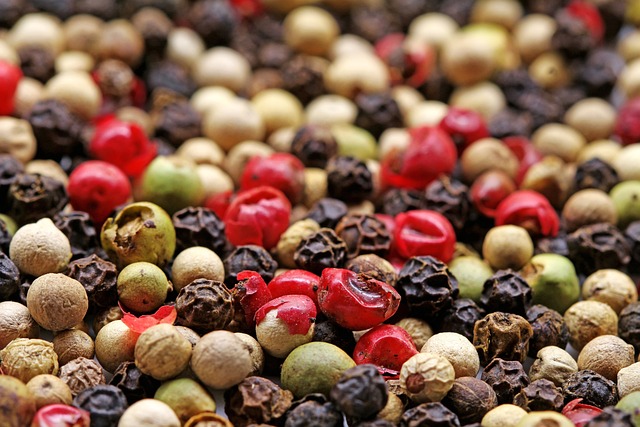Contents
Why Black Pepper Deserves a Spot in Your Immunity Arsenal
Black pepper is not just a simple spice used to add flavor to your food. It also has important health benefits, particularly for your immune system. Here are some reasons why black pepper deserves a spot in your immunity arsenal:
- Antioxidant properties: Black pepper contains antioxidants that can help protect your cells from free radical damage, which can weaken your immune system.
- Anti-inflammatory effects: Chronic inflammation can have a negative impact on your immune system. Black pepper contains compounds that have anti-inflammatory properties, which can help reduce inflammation in your body.
- Immune-boosting nutrients: Black pepper is a good source of vitamin C, which can help boost your immune system. It also contains other immune-boosting nutrients such as vitamin A, iron, and potassium.
- Antibacterial properties: Black pepper has antibacterial properties that can help protect you from harmful bacteria that can compromise your immune system.
So, the next time you reach for the black pepper shaker, remember that it’s not just about adding flavor to your food. It can also help give your immune system a much-needed boost.
Why Black Pepper Deserves a Spot in Your Immunity Arsenal
The Role of Black Pepper in Boosting Your Immunity
Black pepper, also known as the “king of spices,” is more than just a flavor enhancer for your dishes. It has been used for centuries as a medicinal herb in traditional medicine. It contains an active compound called piperine, which gives black pepper its unique spicy taste and impressive health benefits.
Piperine has been found to stimulate the immune system by increasing the production of natural killer cells, which are responsible for fighting off foreign substances in your body. Research also shows that piperine can activate the production of T-cells, another type of white blood cell that plays a vital role in your immune response.
By incorporating black pepper into your diet, you may be able to provide your immune system with an additional line of defense against harmful pathogens.
The Anti-Inflammatory Benefits of Black Pepper
Inflammation is a natural defense mechanism that your body uses to protect itself from harmful substances. However, chronic inflammation is a leading cause of many diseases, including cancer, heart disease, and diabetes.
Black pepper has been shown to have anti-inflammatory properties, thanks to its high concentration of piperine. This compound has been found to inhibit the activity of pro-inflammatory enzymes, which reduces inflammation and oxidative stress.
By reducing inflammation in your body, you may be able to improve your overall health and reduce your risk of developing chronic diseases.
How to Add Black Pepper to Your Diet
Adding black pepper to your diet is easy and doesn’t require any special cooking skills. You can sprinkle it on top of your favorite foods or use it as a seasoning for your meals. It pairs well with many dishes, including eggs, soups, and salads.
If you’re looking for a more creative way to incorporate black pepper into your diet, try making a golden milk latte with turmeric, black pepper, and other spices. This warming drink is a delicious way to boost your immunity and reduce inflammation.
For those who prefer supplements, black pepper extract is also available in capsule form. However, it’s important to talk to your doctor before adding any new supplements to your regimen.
The Bottom line
Black pepper is a simple yet powerful spice that can provide numerous health benefits, including boosting your immune system and reducing inflammation. By incorporating it into your diet, you may be able to improve your overall health and reduce your risk of chronic diseases.
So next time you’re cooking or ordering food, don’t forget to add a sprinkle of black pepper.
Why black pepper deserves a spot in your immunity arsenal
What is black pepper?
Black pepper is a common spice made from the dried fruit of the pepper plant. It is native to India and has been used for centuries in traditional medicine and cuisine.
Why is black pepper good for immunity?
Black pepper contains a compound called piperine, which has been shown to have immune-boosting properties. It also contains high levels of antioxidants, which can help protect cells from damage caused by free radicals.
How can I incorporate black pepper into my diet?
Black pepper can be used in a variety of ways, such as seasoning meat, vegetables, and soups. You can also sprinkle it on top of eggs, salads, and sandwiches for an extra punch of flavor.
Are there any precautions I should take when consuming black pepper?
While black pepper is generally safe for most people, those with gastrointestinal issues or ulcers may want to limit their intake. Additionally, consuming large amounts of black pepper may cause skin irritation or allergic reactions in some individuals. So, it is always advisable to consult with your doctor before including it in your diet.
What is black pepper?
Black pepper is a type of spice that is commonly used in cooking around the world. It is derived from the Piper nigrum plant, which is native to India. Black pepper is known for its pungent, earthy flavor and is often used to season meats, vegetables, and soups.
Black pepper for immunity
Black pepper contains a compound called piperine, which has been shown to have immunomodulatory effects. This means that it can help regulate the immune system and improve its function. Studies have also found that black pepper can enhance the production of immune cells, such as T cells and natural killer cells, which play a key role in fighting off infections and diseases.
Additionally, black pepper has antioxidant properties, which can help reduce inflammation in the body. Chronic inflammation has been linked to a number of health problems, including autoimmune disorders, cancer, and heart disease. By reducing inflammation, black pepper may help improve overall immune function and reduce the risk of these diseases.
If you’re looking to incorporate black pepper into your diet for its immune-boosting benefits, try adding it to your meals as a seasoning or spice. You can also take black pepper supplements, although it’s important to talk to your doctor before starting any new supplement regimen.
For more information on black pepper and its health benefits, visit https://en.wikipedia.org/wiki/Black_pepper.
Introduction
- Black pepper is a commonly used spice in many cuisines around the world.
- It’s not just a flavor enhancer – it has several health benefits too.
- One of the most important benefits is its ability to boost immunity.
Antioxidant properties
- Black pepper contains antioxidants that protect the body from harmful free radicals.
- These antioxidants also help strengthen the immune system by preventing damage to immune cells.
Anti-inflammatory properties
- Chronic inflammation can weaken the immune system and make it more susceptible to infections.
- Black pepper has anti-inflammatory properties that can reduce inflammation and boost immunity.
Vitamin C absorption
- Black pepper can increase the absorption of vitamin C, which is essential for a healthy immune system.
- Adding a pinch of black pepper to meals that are high in vitamin C can help the body absorb more of this important vitamin.
Conclusion
- Black pepper is a powerful spice that can boost immunity and protect the body from infections and diseases.
- By adding black pepper to your meals, you can easily incorporate this immunity-boosting spice into your daily diet.








































